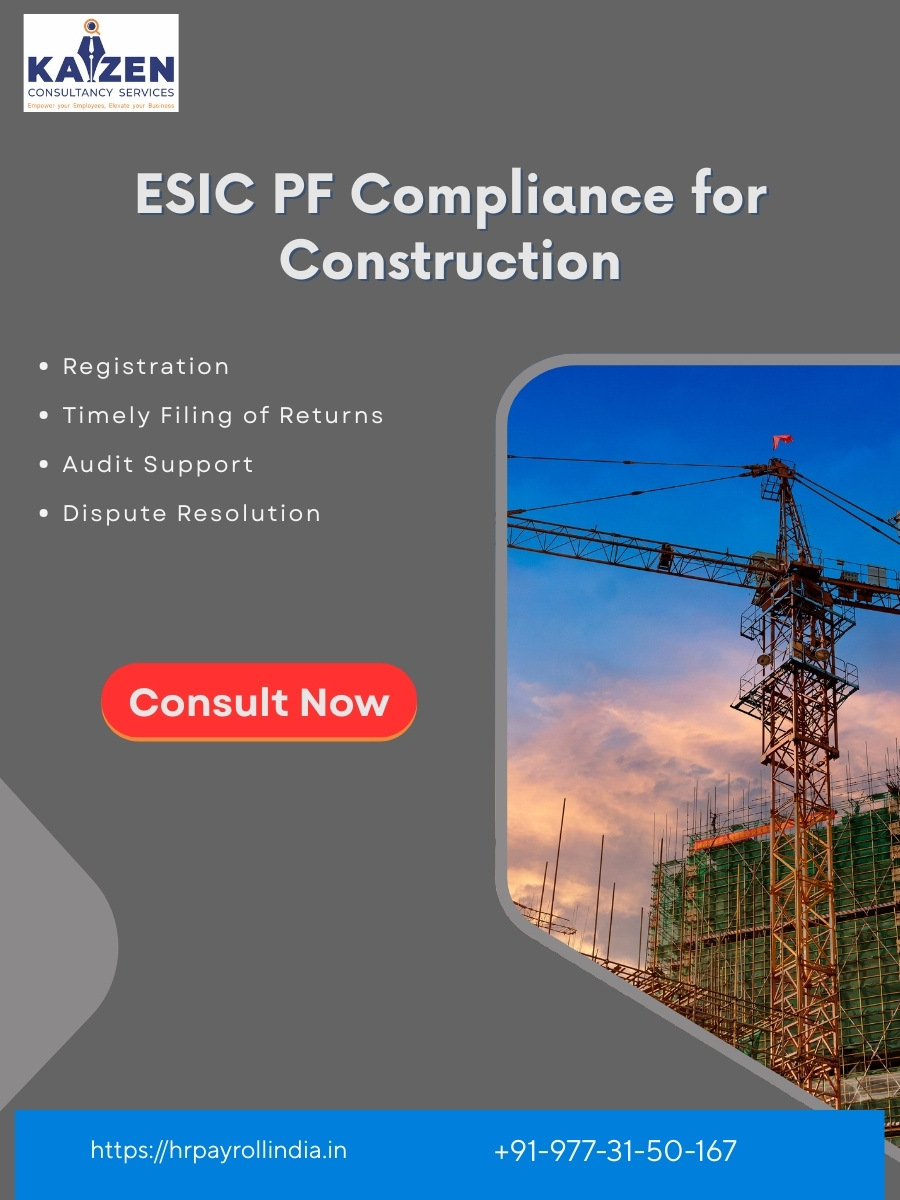Labour Law Compliance
for Construction Industry
India’s construction industry, a cornerstone of economic growth, employs over 50 million workers but faces significant regulatory challenges. Compliance with labour laws is not just a legal requirement but a critical factor in ensuring worker safety, project continuity, and eligibility for government contracts. This guide outlines the key labour law compliance for the Construction Industry, processes, and challenges specific to the construction sector, with actionable insights for businesses in Mumbai, Delhi, and other regions

Labour Laws Compliance for Construction Industry
1 Building and Other Construction Workers (BOCW) Act, 1996
- Applicability: Mandatory for sites employing 10+ workers.
- Requirements:
- Registration: Employers must register with state welfare boards.
- Welfare Measures: Provide amenities like drinking water, first aid, and rest shelters.
- Safety Protocols: Ensure helmets, safety harnesses, and scaffolding for workers.
- Cess Payment: Contribute 1% of project cost to the Construction Workers’ Welfare Fund.
2 Contract Labour (Regulation & Abolition) Act, 1970
- Applicability: For contractors employing 20+ workers.
- Requirements:
- Licensing: Contractors must obtain a license from the Labour Department.
- Wage Parity: Ensure contract workers receive wages equal to permanent staff for similar roles.
- Facilities: Provide restrooms, canteens, and clean drinking water.
3 Minimum Wages Act, 1948
- Applicability: All construction workers, including temporary and migrant labour.
- Requirements:
- State-specific wage notifications (e.g., ₹450–₹700/day in Maharashtra).
- Timely payment of wages without discrimination.
4 Employees’ State Insurance (ESI) Act, 1948
- Applicability: Sites with 10+ employees (metros) or 20+ employees (non-metros).
- Requirements:
- Registration: File Form 1 for employee enrollment.
- Contributions: Deduct 1.75% from employees and pay 4.75% as employer share.
5 Employees’ Provident Fund (EPF) Act, 1952
- Applicability: Establishments with 20+ employees.
- Requirements:
- Registration: Submit Form 5A to the EPFO.
- Contributions: Deduct 12% of basic wages from employees and match it as an employer.
Compliance Process: Registration, Forms, and Deadlines
1. Registration Requirements
- BOCW Registration: Submit project details to the state welfare board.
- EPF/ESI Registration: Mandatory within 30 days of hiring thresholds.
2. Key Forms and Deadlines
Compliance | Form | Purpose | Deadline |
EPF | ECR (Electronic Challan) | Monthly contributions | 15th of every month |
EPF | Form 3A & 6A | Annual return (employee-wise summary) | 30th April |
ESI | Monthly Challan | Contributions for insured employees | 15th of every month |
ESI | Form C-11 | Annual return | 31st May |
BOCW | Form IV | Accident reporting | Within 24 hours |
3. Documentation
- EPF/ESI: PAN, employee details, wage registers.
- BOCW: Project cost estimates, safety audit reports.
- Contract Labour: License copy, attendance records.
Unique Challenges in Construction Compliance
- Migrant and Temporary Workers
- Issue: High attrition and informal hiring complicate record-keeping.
- Solution: Use digital attendance systems (e.g., biometrics) to track workers.
- Multi-State Operations
- Issue: Varying state laws (e.g., different minimum wages in Maharashtra vs. Uttar Pradesh).
- Solution: Partner with consultants familiar with regional regulations.
- Safety Risks
- Issue: Construction accounts for 24% of workplace fatalities in India.
- Solution: Regular safety audits and training under BOCW Act, 1996.
- Delayed Wage Payments
- Issue: Leads to disputes and penalties under the Payment of Wages Act, 1936.
- Solution: Automate payroll systems with Kaizen Consultancy Services – Payroll Solution
Role of Specialized Labour Law Consultants
- Compliance Management
- Registration: Handle EPF, ESI, and BOCW registrations.
- Return Filings: Submit ECR, Form 3A, and accident reports on time.
- Audit Support
- Prepare for inspections by maintaining:
- Wage registers.
- Safety equipment logs.
- Contribution payment records.
- Dispute Resolution
- Address worker grievances related to wages or accidents under Industrial Disputes Act, 1947.
- Technology Integration
- Implement ERP systems for real-time compliance tracking.

Benefits of Compliance
- Legal Protection: Avoid penalties (e.g., ₹20,000 for delayed EPF filings).
- Project Eligibility: Mandatory for securing government contracts (e.g., road construction tenders).
- Worker Retention: ESI healthcare and PF savings improve employee loyalty
Government Initiatives Supporting Compliance
- Shram Suvidha Portal: Single-window compliance for labour laws.
- BOCW Welfare Schemes: Free skill training and health insurance for registered workers.
- Tax Incentives: Deductions under Section 80C for EPF contributions.
Labour law compliance in the construction industry is a complex but non-negotiable requirement. From managing migrant workers to navigating multi-state regulations, specialized consultants play a pivotal role in simplifying compliance. Businesses in Mumbai, Delhi, and other cities must prioritize adherence to acts like BOCW, EPF, and ESI to avoid penalties, secure contracts, and foster a safer workplace.
Contact our expert Labour Law Consultants – Kaizen Consultancy Services today to streamline your construction compliance!
